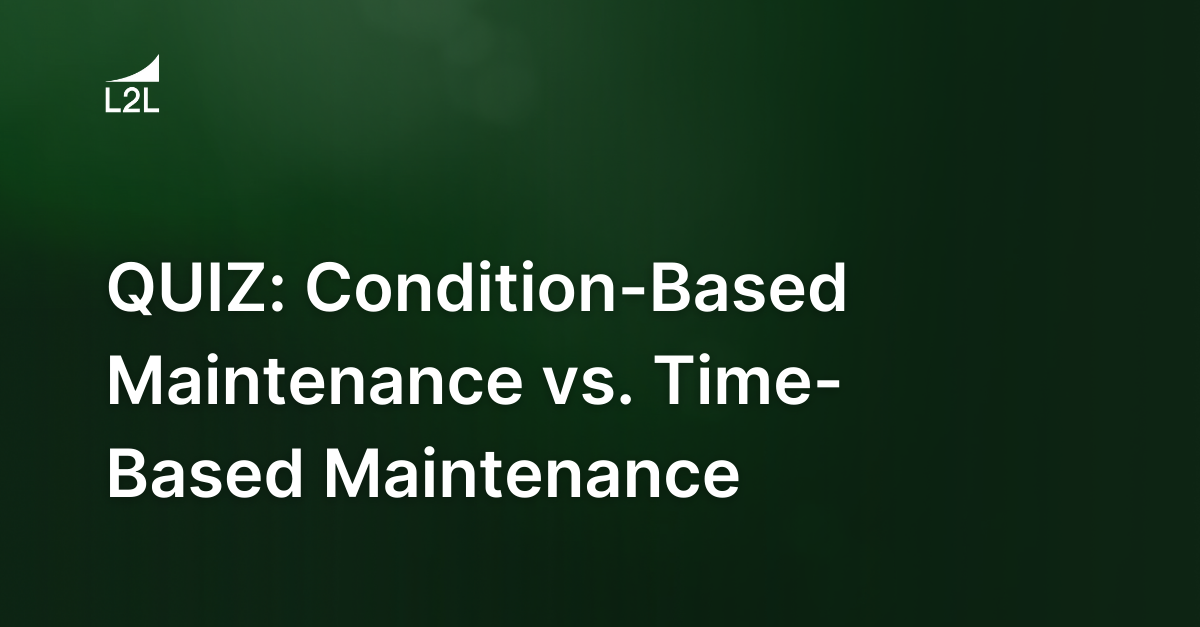
Check your knowledge with these True or False questions:
Question 1: Time-based maintenance refers to recording a time of day when the maintenance is performed.
Question 2: Condition-based maintenance is maintenance performed, on contingency, depending upon the condition of the equipment or system.
Question 3: Condition-based maintenance need not rely on the subjective judgment of an experienced individual.
Question 4: Almost all maintenance is very efficient and is scheduled to be performed at precisely the right time.
Question 5: A well-planned maintenance strategy does not often result in operational cost savings.
Answers
1 FALSE
Time-based maintenance is maintenance performed at a specific predetermined time or time interval. A filter may be changed once per month, or once per year. It is generally performed without regard to its condition. This type of maintenance may be set up to satisfy manufacturer guidelines, based on historical data showing when it is prudent to perform; a set amount of time. It is driven by a calendar and is often most efficient and cost effective to accomplish it this way.
2 TRUE
Condition-based maintenance may require testing, inspection, and assessment on a periodic basis. Many materials and equipment may be designed to last for a long lifespan. They also may depend on environmental conditions, hours of usage, and the severity of service. Condition-based maintenance is better when maintenance is costly, disruptive, and dependent upon operating hours and the environment. A plant shutdown may be an opportune time to inspect, or repair, based on other data such as wear and the manufacturer’s recommendation of operational hours. Thus, it is a good candidate for condition-based maintenance.
3 TRUE
Automation and digital technology can help determine a decision to maintain and repair equipment. Such automatic indicators include machine intelligence, monitoring systems (sensors), and advanced automation that utilizes Industry 4.0 technology via the Internet of Things (IoT) to signal the need for maintenance.
4 FALSE
Maintenance professionals struggle to apply the right type of maintenance (condition-based or time-based) to the appropriate equipment and components, at the appropriate time. Much maintenance follows a time-based method, often influenced by manufacturers and other parties who stand to benefit from the maintenance.
However, condition-based maintenance must be balanced with time-based by considering the required disruption, required testing, and the cost of performing maintenance within a specific maintenance window. Maintenance plans are best developed from experience and analysis of historical data, use automation, and include anecdotal data from experienced professionals. Achieving the best maintenance program requires technology, software, and other tactics, used with discipline, to develop an effective and efficient maintenance strategy.
5 FALSE
A carefully developed maintenance plan and strategy will usually pay for itself when properly executed. It avoids redundant work and does not entail over-investing in time and resources to be successful. This is especially true when organizations employ a combination of Preventive Maintenance, Operator Performed Maintenance (on minor tasks), and utilizing skilled, experienced Maintenance professionals.
Revisions
Original version: 29 January 2020
Written by: L2L
Reviewed by: Daan Assen
Please read our editorial process for more information
Related Posts
Subscribe to Our Blog
We won't spam you, we promise. Only informative stuff about manufacturing, that's all.



